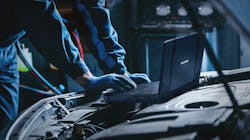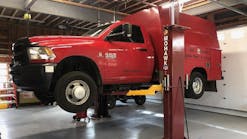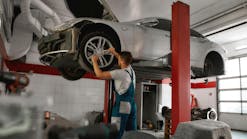Your service area requires more than off-the-shelf computers
Dec. 16, 2022
Related To:
As the owner or manager of an automotive service center, you spend parts of your day behind the counter dealing with customers, in your office doing managerial duties, and out in the shop working with or supervising the technicians. One common denominator of these three different tasks is that each uses a computer.
Working the counter, you input or download customer and vehicle information into a computer. In your office, you use a computer to pay bills, purchase inventory, receive and send emails, and check out what the competition is up to. Out in the shop, you and the crew are busy using tablets and laptops to keep track of jobs, watch service/repair tutorials, and access real-time information regarding parts on hand.
Computers today are as essential to your operation as cases of oil, racks of tires, and impact guns.
But therein lies the catch. Just as oil and tires are not "one weight fits all" or "one size fits all," so are the computers you use in the different areas of your shop. The type of computer that best serves your counter and office needs is not the best choice for the shop floor.
Once you head into the "back of the house" area, it's an entirely different environment. The off-the-shelf everyday computers that work fine up front are not designed for harsh shop environments and will quickly break down. Having a computer down means the work slows to a crawl, or, worse yet, the technicians cannot work, adversely affecting your bottom line.
The best way to avoid that is to use fully rugged computers in the shop or, minimally, a semi-rugged device. Rugged devices, depending on their ratings, are designed to work in extreme temperatures, withstand three or four-foot drops off a workbench, resist shocks and vibrations, and be waterproof and dustproof. A rugged laptop is engineered to be mobile and built to operate reliably in dusty or wet environments and conditions. They also have thicker, stronger housings than regular everyday laptops.
Fully rugged computers: maximum durability
A fully rugged device also complies with other essential requirements, such as high-performance and governmental-grade security. They also are usually IP65, or even IP66 and MIL-STG-810 certified. In plain English, they are reliable day in and day out. You may be wondering what IP65 and MIL-STG-810 are. IPXX is part of the international standard IEC 60529. The IP portion stands for ingress protection. The first digit (ranging from zero to six) represents protection against dust and foreign objects, and the second digit (ranging from zero to eight) represents the degree of airtightness against moisture and water intrusion. The larger the number, the higher the protection level.
The IPX standards provide users with more detailed information than vague marketing terms such as water-resistant or waterproof. For example, IP65 means protection from total dust ingress and low-pressure water jets from any direction.
MIL-STD-810H is a series of tests designed by the U.S. military to test equipment limits in various conditions where the item is expected to be used (environment) or transported (shocks). High/low temperature, transit drop (shock), and humidity resistance are the most common environmental tests. The testing standards vary based on the positioning of the device.
Semi-rugged computers: A budget-friendly option
You may also come across laptops and tablets that are labeled "semi-rugged." Semi-rugged computers are usually enhanced versions of commercial off-the-shelf (COTS) hardware. The components are the same, but they are protected better. For example, a semi-rugged laptop might have a thicker case, a gel-mounted storage drive, and a spill-resistant keyboard. They also might have a protective case or rain-resistant body.
A semi-rugged device is usually IP5x and MIL-STG-810 certified. However, semi-rugged laptops are less expensive than fully rugged models. As a result, semi-rugged devices find their niche in areas that demand specialized devices with some 'rugged' features but will not experience the extreme level of wear and tear or temperatures that a fully rugged device is built for.
Both rugged and semi-rugged computer devices can deliver tremendous value in your shop area.
Other features to look for in a rugged computer
Once you have decided on a rugged computer for your work area, there are some other features to consider including in your device based on your unique needs.
Do you want a laptop or tablet? Both have different benefits for auto service technicians. While rugged laptops come with attached keyboards that make data entry easier, rugged tablets are more portable and fit better in tight spaces while still providing the same computing power and connectivity.
NVMe PCIe solid-state drives are the latest storage technology and can provide up to 1TB of storage. They also offer speeds 4x faster than SATA III. Some manufacturers design a unit to accommodate two additional internal SATA III SSD drives to maximize onboard storage. Some also provide a media bay for different setup options, such as an optical disk drive, a second battery, or a third SATA III SSD storage.
An array of built-in interfaces with numerous add-ons – such as Thunderbolt 4, HDMI + VGA + USB Type-C DP, RJ-45 ports, RS-232 serial ports, Smart card/CAC reader, RFID reader, ExpressCard 54, and PCMCIA Type II slot – can prove beneficial. Plus, USB options, including Type-C to Type-A, USB 3.2 Gen2, and USB 2.0, are helpful to have.
A 10-point capacitive multi-touch panel with multi-touch modes (glove, stylus, water, finger) optimizes a unit for applications virtually anywhere, enhancing the device's usability regardless of work conditions. Speaking of the display, sunlight-readable screens make viewing and reading much easier, especially if service areas are outdoors.
Manufacturers such as Durabook also offer customization programs that allow you to basically design the rugged device yourself to meet your unique needs.
Let's not forget after-the-sale assistance. It, too, is a vital consideration in choosing a rugged-computer brand, as it is always more enjoyable to work with a manufacturer that provides dedicated product support and superior customer service.
If you have questions about using a rugged laptop or tablet in your shop area, ask one of the manufacturers. We would be happy to help you out.
Voice Your Opinion!
Voice Your Opinion!




